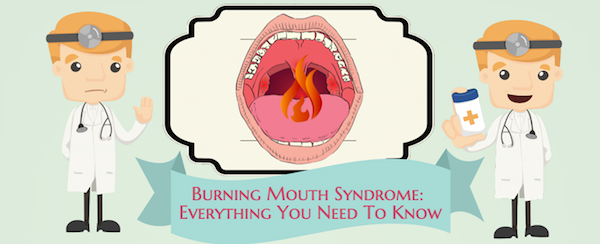Burning mouth syndrome (BMS) is a rare condition that can flare up after cancer treatment. It’s the result of irritation of your taste buds, nerves and other tissues in your mouth. This can make eating, drinking, chewing and speaking very difficult and painful. As an advanced practice registered nurse who specializes in oncology nursing, you are likely well aware of how challenging it can be to treat patients who have been diagnosed with cancer. Read on about Manage Burning Mouth Syndrome after Radiation.
The disease often affects numerous aspects of their lives including their diet, sense of smell, speech and everyday habits such as smoking or drinking alcohol. With so much to consider during every patient interaction, it can be easy to overlook small details as you go about your daily routine but these things are important especially when managing a case of burning mouth syndrome post radiation treatment.
What is Burning Mouth Syndrome?
Burning mouth syndrome is believed to be caused by nerve damage or irritation. When this happens, it causes a burning sensation on the tongue, gums, roof of the mouth and inside of your cheeks. It can also cause dry mouth and feeling of something foreign in your mouth. When you have burning mouth syndrome, the nerves in your mouth are damaged and can’t send pain signals to your brain. This means you won’t be able to feel pain in your mouth like you normally would. Instead of normal pain, you’ll feel a burning sensation. People who smoke, drink alcohol, have diabetes or are taking certain medications are more likely to develop burning mouth syndrome.

Why does Radiation cause BMS?
Although not every patient will experience it, radiation treatment is one of the most common culprits of burning mouth syndrome. The reason being that radiation treatments will destroy cells in the head and neck region of your body. Burning mouth syndrome is caused by the destruction of the nerves in the mouth. The radiation treatment will destroy the cells in the oral mucosa, which is the lining of the mouth. The nerves in the mouth are responsible for the sensations of pain and temperature in the mouth. Radiation can damage these nerves and cause burning mouth syndrome.
Managing BMS Post Radiation Treatment
If you are experiencing burning mouth syndrome, there are several steps you can take to help manage the symptoms. Firstly, make sure you are drinking plenty of water. This will help you to stay hydrated and avoid excessive dryness of the mouth and tongue. Once you have increased your fluid intake, it is recommended that you use a sodium bicarbonate mouthwash. This can help to get rid of the dryness and reduce the discomfort of the burning sensation. People who experience burning mouth syndrome should avoid eating spicy, salty, sour and acidic foods. Doing so can irritate your mouth and increase the discomfort of the symptoms. When eating, try to use a soft, bland diet. It may be best to avoid crunchy or hard foods because they can be painful when your mouth is already inflamed.
How to manage Mouth Sores after Radiation
If you are experiencing mouth sores post radiation treatments, there are several steps you can take to manage them. Firstly, make sure you are consistently drinking water to avoid excessive dryness of the mouth and tongue. Once you have increased your fluid intake, you can use a sodium bicarbonate mouthwash to help get rid of the dryness and reduce the discomfort of the sores. Once the sores have healed, you can begin to eat a soft bland diet. Avoid eating spicy, salty, sour and acidic foods as they can irritate your mouth and exacerbate the symptoms. If you experience mouth sores, try to avoid crunchy or hard foods because they can be painful when your mouth is already inflamed.
What is a Broken or Chipped Tooth?
As an advanced practice nurse, it is important to be aware of the symptoms of burning mouth syndrome and how they differ from other oral issues like dry mouth, mouth sores and oral pain. In order to appropriately identify the symptoms, it is important to understand the anatomy of your mouth. Areas of the mouth affected by burning mouth syndrome include:
The tongue
The roof of the mouth
The gums
The inside of the cheeks If you notice any of these symptoms, it is important to let your doctor know. If you are experiencing any of these symptoms, there are several steps you can take to manage them. Firstly, make sure you are consistently drinking water to avoid excessive dryness of the mouth and tongue. Once you have increased your fluid intake, you can use a sodium bicarbonate mouthwash to help get rid of the dryness and reduce the discomfort of the symptoms. Once the symptoms have subsided, you can begin to eat a soft bland diet. Avoid eating spicy, salty, sour and acidic foods as they can irritate your mouth and exacerbate the symptoms.
Conclusion
Radiation treatment is a powerful treatment option for cancer patients, but it comes with some side effects. Burning mouth syndrome is one of the most common side effects of radiation treatment. Once you have increased your fluid intake, it is recommended that you use a sodium bicarbonate mouthwash. If you experience mouth sores, make sure you are consistently drinking water to avoid excessive dryness of the mouth and tongue. Once the sores have healed, you can begin to eat a soft bland diet. Avoid eating spicy, salty, sour and acidic foods as they can irritate your mouth and exacerbate the symptoms. If you experience mouth sores, make sure you are consistently drinking water to avoid excessive dryness of the mouth and tongue. Once the sores have healed, you can begin to eat a soft bland diet. Avoid eating spicy, salty, sour and acidic foods as they can irritate your mouth and exacerbate the symptoms.
Follow Us For More Updates





royal dental clinic so many good